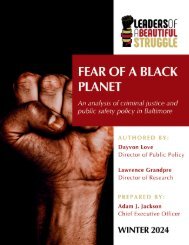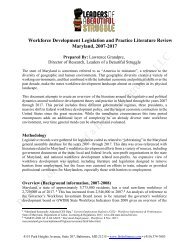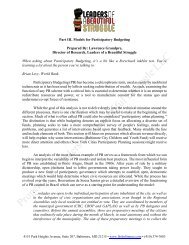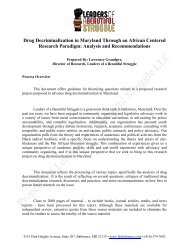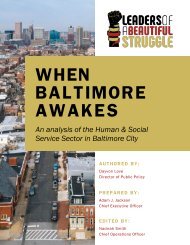The Communal Impacts of Drug Criminalization in Maryland
This project attempts to reframe the harms of drug criminalization. Influenced by African-Centered Research Methodologies, we engaged in a literature review and qualitative research of the communal impacts of drug decriminalization in Maryland, with a specific focus on Baltimore.
This project attempts to reframe the harms of drug criminalization. Influenced by African-Centered Research Methodologies, we engaged in a literature review and qualitative research of the communal impacts of drug decriminalization in Maryland, with a specific focus on Baltimore.
You also want an ePaper? Increase the reach of your titles
YUMPU automatically turns print PDFs into web optimized ePapers that Google loves.
Def<strong>in</strong>itions<br />
Black Civil Society<br />
This report addresses critical bl<strong>in</strong>d spots with<strong>in</strong> academic literature that looks beyond the public health<br />
fram<strong>in</strong>g <strong>of</strong> <strong>in</strong>dividual-level harms and evaluates the social disruption <strong>of</strong> communal <strong>in</strong>stitutions, referred<br />
to <strong>in</strong> this report through the concept <strong>of</strong> Black civil society.<br />
<strong>The</strong> Oxford Dictionary <strong>of</strong> Politics def<strong>in</strong>es civil society as the set <strong>of</strong> <strong>in</strong>termediate associations which are<br />
neither the state nor the (extended) family; civil society therefore <strong>in</strong>cludes voluntary associations, firms,<br />
and other corporate bodies (34). With<strong>in</strong> the context <strong>of</strong> this report, Black civil society should be seen as the<br />
<strong>in</strong>terrelationship between <strong>in</strong>stitutions largely occupied by, serv<strong>in</strong>g, and/or controlled by Black people to<br />
meet essential community needs and fulfill community desires. Analysis <strong>of</strong> Black <strong>in</strong>stitutions, <strong>in</strong>clud<strong>in</strong>g<br />
mutual aid societies, shows Black civic organizations serv<strong>in</strong>g critical roles, meet<strong>in</strong>g essential community<br />
needs rang<strong>in</strong>g from health care, burial costs, and f<strong>in</strong>ancial sav<strong>in</strong>gs (35). As def<strong>in</strong>ed by Marion Orr <strong>in</strong> the<br />
book, Black Social Capital: <strong>The</strong> Politics <strong>of</strong> School Reform <strong>in</strong> Baltimore, Black civil society undergirds the<br />
organizational <strong>in</strong>frastructure to advance Black <strong>in</strong>terests and serves as “agents <strong>of</strong> social reform on issues <strong>of</strong><br />
economic empowerment, spiritual development, and social and political equality (12).” Akbar notes how<br />
ACRP research f<strong>in</strong>d<strong>in</strong>gs should be used for “the process <strong>of</strong> liberation and <strong>in</strong>stitution build<strong>in</strong>g for a<br />
historically oppressed people (3).”<br />
As we identify the adaptive strategies and characteristics for our advancement from our research<br />
methods, those strategies must serve as the guidel<strong>in</strong>es for structur<strong>in</strong>g our <strong>in</strong>stitutions. Educational<br />
<strong>in</strong>stitutions must <strong>of</strong>fer content that advances self-knowledge as well as <strong>of</strong>fer<strong>in</strong>g <strong>in</strong>struction through the<br />
demonstrated modalities that build on our strengths. Economic <strong>in</strong>stitutions must be built that address<br />
our critical survival needs while be<strong>in</strong>g consistent with our model <strong>of</strong> humanity and community. Our<br />
religious <strong>in</strong>stitutions must be critiqued and developed along l<strong>in</strong>es that foster our spirituality and enhance<br />
our collective development. All <strong>of</strong> these modalities provide the ultimate objective <strong>of</strong> augment<strong>in</strong>g and<br />
<strong>in</strong>stitutionaliz<strong>in</strong>g the African-American paradigm rooted <strong>in</strong> nature and respect for humank<strong>in</strong>d.<br />
This report focuses on formal and <strong>in</strong>formal Black civil society <strong>in</strong>stitutions related to addiction prevention<br />
and communal care. Examples <strong>of</strong> formal <strong>in</strong>stitutions <strong>in</strong>clude Black churches, Black-led community<br />
nonpr<strong>of</strong>its, historical Black colleges and universities (HBCUs), the Black Panthers and <strong>in</strong> Baltimore<br />
specifically, the Goon Squad, and Baltimoreans United <strong>in</strong> Leadership Development (BUILD) (36). While<br />
more <strong>in</strong>formal <strong>in</strong>stitutions <strong>in</strong>clude street organizations (<strong>of</strong>ten called "gangs"), networks <strong>of</strong> "grey market"<br />
18 <strong>of</strong> 55




